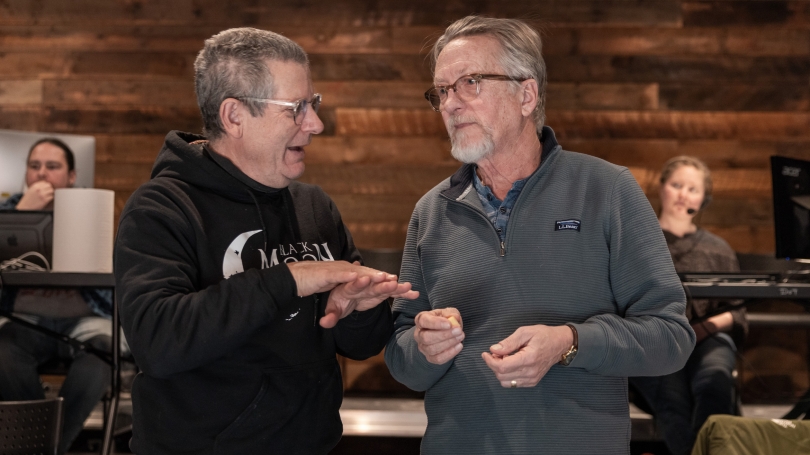

The School for Lies, which runs Feb. 14–22 at Theater on Currier, marks scenic designer Michael Ganio and director Jamie Horton's last Dartmouth show.
David Ives' comedy of manners The School for Lies brims with wit and whimsy this winter as the Department of Theater's MainStage production—with a bittersweet note: It marks beloved theater professors Michael Ganio and Jamie Horton's final Dartmouth show.
"Michael and Jamie were the epitome of artist and teacher," theater professor and department chair Dan Kotlowitz wrote in a program note. "Both had extraordinary careers in theater (and film) and gave their all to sharing their wisdom, artistry, and hard-earned common sense with every student they encountered."
Horton arrived at Dartmouth in 2005 to direct The Heidi Chronicles and has served for more than 13 years as director of theater. "Since then, he has directed almost a dozen shows at Dartmouth, always with the student experience at the forefront of his attention," Kotlowitz says. "His sensitivity, drive, and limitless energy saw us through the good times and the incredibly complicated times of the COVID-19 pandemic."
Ganio came to Dartmouth in 2015 to design the set for the musical Chicago. "We immediately knew that we had found a gem," Kotlowitz says. "In Michael, we saw a theater artist who was meticulously thoughtful and deliberately paced—you could see the creativity grow in Michael's mind as he slowly and generously parsed out his thoughts and ideas. Michael forced us all to slow down and thoroughly consider each thought, each idea, and each shared moment… in short, he taught us to take a moment and smell the flowers of the creative process."

"The language of School for Lies, filled with delicious anachronisms, has a uniquely modern feel to it, one that makes this adaptation of Molière's Misanthrope so accessible to today's audiences," Horton says. "I love farce as a theatrical form. It's challenging, yes, but so rewarding when it works. And we need to laugh—to find joy where we can, as others have said—in this deeply alarming time. Laughter throughout our rehearsal process has been a salve for all of us."

"Working with Professor Horton has been nothing short of a masterclass in comedy," says Hannah Brooks '26. "Every rehearsal has been an opportunity not only to witness his brilliance in action but also to learn from it, and I feel my own instincts as an actor are constantly improving because of it."

"Michael is a brilliant designer and a joy to work with, always," Horton says. "He is a true collaborator throughout the process, from earliest discussions all the way through opening. I welcome his input as I direct, because his eyes and theatrical instincts are so good. And he works as hard as anyone I know. We are so lucky to have had him here at Dartmouth."
"During my decade at Dartmouth I have most cherished dancing on the knife blade where scholarship and practice collide, revealing to students that living a life driven by creativity will always lead to a life well lived," Ganio says.

Horton is widely admired for his care for the student experience. "I have watched so many students grow in ability, connection, and confidence due to his encouragement and gentle nurturing," says Kathleen Cunneen, director of new student programs, who has worked with Horton on numerous productions.
Actor Max Samuels '15 cherishes Horton as a teacher, director, mentor, friend, and most recently, colleague. "While Jamie's talent and intelligence are undeniable, it's his character that looms largest for me," he says. "When I'm at my best—as an actor and a person—you can be sure that Jamie's influence is a key ingredient."

"Like most theater artists, I've always believed in the power of theater to make change—change in those who create it as well as those who make up its audience," Horton says. "The greatest joy as a teacher of theater is to see growth in one's students, to witness their talents take shape and flourish, regardless of their level of previous theater experience and ultimate career path. Through the process of discovery, of collaboration and commitment, all of which are central to this art form, we develop real community and relationships that endure well beyond our shared time at Dartmouth."